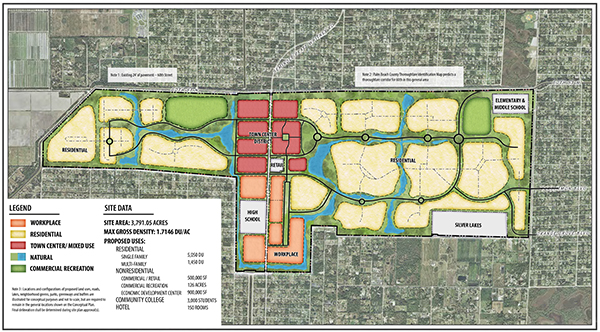On Aug. 8, the Palm Beach County Planning Commission will convene a public hearing on Minto’s plan to change the Future Land Use Atlas, allowing it to increase the approved uses at the 3,750-acre former Callery-Judge Grove property.
The request, designed to accommodate the planned Minto West development, would increase the density from 2,996 residential units and up to 235,000 square feet of non-residential use, to 4,549 homes and up to 2.1 million square feet of non-residential use.
Minto purchased the Callery-Judge property for $51 million last year.
The planning commission is an advisory board to the Palm Beach County Commission, and the county commission has already overruled the planning commission once on the topic of Minto West.
In April, the county commission voted 6-1 to accept Minto West’s privately initiated request for a comprehensive plan amendment that would allow consideration of the company’s plan, over the protests of dozens of residents and an 11-0 recommendation for denial by the planning commission.
County staff recommended approval so that the county would have more time to research the merits and issues of the request.
“It was a request to fast-track and get everything going so that they could make their application quicker,” said former Loxahatchee Groves Councilman Dennis Lipp, a member of the planning commission. “The recommendation [by staff] was to proceed anyway.”
The planning commission meeting is set for 9 a.m. next Friday at the Planning, Zoning & Building Department in the Vista Center complex on Jog Road.
Attorney Marty Perry, who heads the Indian Trail Improvement District’s effort to help develop strategies addressing the influx of proposed developments in the area, downplayed next week’s meeting.
“I don’t see a lot changing at this particular hearing. I don’t want to downsize their role in any way, but the reality is that they are a purely recommending body and advisory in nature,” he said. “Sometimes the county commissioners follow their recommendation, and sometimes they don’t. The real hearing is going to be when we get to the Board of County Commissioners.”
That hearing is set for 9:30 a.m. on Wednesday, Aug. 27, in the sixth-floor commission chambers at the County Governmental Center, 301 N. Olive Ave., West Palm Beach.
Perry said he has started meeting with commissioners to get their feeling on the proposed increase in density.
“I think that they show concern relative to the issue of roads,” Perry said. “I think that there’s a general feeling that there’s going to be development out there. The question is really how much. What I’ve been trying to direct them to is really not a question of the development so much as the ability of the roads to handle it. I think everybody pretty much recognizes that there is going to be some development. The question is how do we deal with it, and how do we keep it from going through the neighborhoods?”
At the April county commission meeting, county staff pointed out that the Callery-Judge property had been determined as the appropriate location for commercial uses in the now-defunct Sector Plan. Commissioners also pointed out that under recently revised state law, the transmittal request would go to the state anyway, but the Palm Beach County Commission has final say on any density increases.
In 2005, Callery-Judge’s owners applied for a development of regional impact, proposing 10,000 homes and more than 4 million square feet of non-residential uses, as well as attempting to address water and drainage issues. The application was approved by the Department of Community Affairs, which is now called the Department of Economic Opportunity, as well as the Treasure Coast Regional Planning Council, but the county commission voted down the application in 2007.
Callery-Judge successfully petitioned Florida’s Legislature for a statute creating the Agricultural Enclave Act, written specifically for the Callery-Judge property, which allows the owner of an undeveloped property to develop in keeping with the surrounding area.
In 2008, Callery-Judge invoked that act, and the county adopted comp plan amendments that incorporated elements of the act. This got the land its vested approval for 2,996 homes.
Minto has argued that its application will help correct shortcomings in the development patterns in the area, including insufficiently developed roads and drainage, and inadequate work centers for the population.
More information about the county’s Minto West timeline can be found at www.pbcgov.com/pzb/minto. Minto runs an informational site at www.mintoinfo.com.








